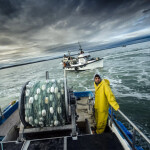American Seafoods and its allies in a lawsuit they filed against the U.S. government are countering claims made by U.S. Customs and Border Protection in a fight over whether a 100-foot dead-end rail line in New Brunswick, Canada, is legal under an exception to the Jones Act, which requires all domestically-caught seafood to be transported via vessels built in the United States with U.S. materials.
The Seattle, Washington, U.S.A.-based pollock fishing firm and its affiliates in its supply chain are fighting the USD 350 million (EUR 294.3 million) in fines they were issued in August by CBP over alleged Jones Act violations. American Seafoods subsidiary Alaska Reefer Management (ARM) and Kloosterboer International Forwarding (KIF), which operates the rail line – known as the Bayside Program – have sued to prevent CBP from collecting the existing fines or from issuing any new fines, arguing the railway was approved by CBP under the third proviso to the Jones Act, which allows for exemptions to the law for some transportation routes.
“The [Bayside Program’s] use of a 100-foot rail line that involves transportation of goods by rail from point A to point B and then back to point A is simply another form of rail trackage designed to comply with the third proviso,” the companies wrote in a 14 September response filed in U.S. District Court, where the case is being heard. “Despite the complete public visibility of all details of the Bayside Program to both CBP and the general public, and the evidence that plaintiffs acted reasonably, in reliance on the applicable CBP rulings, CBP sat back and watched the Bayside Program progress for well over four years without a single word to plaintiffs or anyone else involved in the program that might provide notice of an investigation as to whether the Bayside Program complied with the third proviso. Indeed, CBP never notified plaintiffs that, notwithstanding CBP’s consistent rulings that a tariff filing was not required for third proviso compliance in these circumstances, CBP had reversed its position and intended to bring a massive enforcement action based on its new position, without providing for public review and comment.”
ARM and KIF argue they faced no obligation to seek out an interpretive ruling when it amended its route to include the new rail line in 2012, as previous Ruling Letters issued by CBP had approved a similar route, and that nothing significant was changed
“The Bayside Program is substantially identical to what was in effect prior to 2012, just more efficient, so there was no reason to seek an interpretative ruling from CBP. Any revision to this long-standing interpretive guidance required CBP to follow its notice and comment rulemaking obligations,” they wrote. “The Bayside Program was known to CBP and authorized by CBP’s multiple Ruling Letters that remain in full force and effect approving a substantially identical through route.”
CBP has insisted it was only made aware of the change in the route after it received a letter of complaint from an unnamed party in 2017, but in a sworn declaration filed 14 September, Bayside Port Corporation COO Darrell B. Weare said Kloosterboer Bayside Cold Storage General Manager Christy McManus said CBP officers were on site before, during, and after construction of the railway in Bayside in 2012.
“CBP did some observation one morning after the rail had been operating for a couple of months. The ramp that would have allowed the trucks to exit the flat rail cars was not installed once [we] learned from CBP that as soon as the rail cars touched the stops on the south end of the rail trackage, their destination had been reached. Thus, it was irrelevant where the trucks were discharged. The driver had to exit the truck during the rail movement to ensure that it was just the truck and trailer being transported in accordance with standard rail safety procedures,” McManus allegedly told Weare.
ARM and KIF complained CBP never informed them between 2012 and 2017 of any change in its interpretation of whether the third proviso applied to the route, and “sprung” the fines on them last month without engaging in any conversation about the issue, either publicly or directly with the companies.
“Never once during those more than four years did CBP ever seek any information as to plaintiffs’ reasoning concerning its compliance, or even indicated that it was investigating the Bayside Program so plaintiffs, if appropriate, could have considered viable alternatives.” they wrote. “Despite plaintiffs’ understanding and belief that they were in full compliance with the Jones Act, had they been advised by CBP of the purported concerns, plaintiffs immediately would have met with CBP to discuss and address them and promptly would have modified their program to the extent the parties agreed necessary to remain in full compliance with all third proviso requirements. CBP’s suggestion to the contrary is baseless.”
Nevertheless, ARM and KIF defended the validity of the Bayside Program and refuted CBP’s assertion the railway needed to be “continuous,” alleging the third proviso requirement of a “through route” applied to the larger process of bringing pollock from Alaska to the U.S. East Coast.
“There is no requirement, either statutorily or in CBP’s interpretive rulings, that the [railway] must be a certain length, travel for a set duration, constitute a meaningful percentage of the total through route, or even connect two distant points,” they wrote. “The use of the [railroad] in the Bayside Program complies in every way with the plain and unequivocal text of the Jones Act and the third proviso.”
The CBP’s harsh enforcement is harming American businesses – the exact opposite intention of the Jones Act, according to ARM and KIF.
“The penalty notices will do nothing but hurt American companies and consumers in the short- and long-term,” they wrote. “CBP’s destruction of Alaskan fishing businesses, destruction of American food processing and related jobs, and destruction of the American food supply surely do not further the Jones Act’s purpose.”
Photo courtesy of U.S. District Court for the District of Alaska







